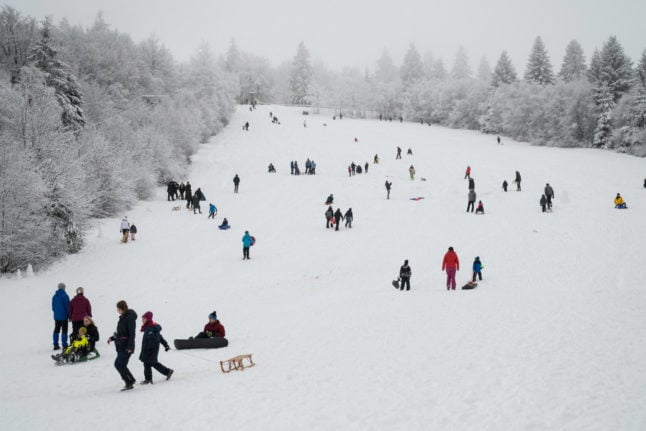People in Germany have been urged to stay at home as much as possible and avoid travel as the country grapples with high Covid-19 cases.
But snowfall in the Erzgebirge, Sauerland and Black Forest regions attracted winter sports fans, resulting in violations of coronavirus restrictions, groups of people and large traffic jams.
Police swooped on the Fichtelberg in the Ore Mountains in Saxony as people ignored the rules to experience the snowy weather.
Officers registered more than 100 violations of restrictions on Christmas Day and Boxing Day alone.
#Schnee zieht Menschenmassen in die Berge
Mehr als 100 Anzeigen wegen #Corona-Verstößen im #Erzgebirge. Trotz der höchsten #CoronaInzidenz Deutschlands strömten Menschen auf den #Fichtelberg in #Sachsen. https://t.co/2lMOa84BHD pic.twitter.com/MyAsAR1Z10
— Ernst v. All ? (@ErnstvAll) December 27, 2020
Social networks were flooded with pictures of people taking advantage of the Christmas holidays to go sledging or for a walk in the snow on the Fichtelberg – in some areas, they were crowded together.
The eastern state of Saxony has the highest coronavirus rate in Germany and is currently in a strict lockdown, with a curfew in place.
People are only allowed to leave their homes for a valid reason. Resident can only travel up to 15km from their home for exercise or essential shopping. From December 24th to 26th the contact restrictions were relaxed, but not other rules.
Traffic jams and accidents in Sauerland
According to police, the resort town of Winterberg, which was covered in snow, also experienced a rush of visitors on Sunday with traffic jams and a number of traffic accidents.
A police spokesman for the Hochsauerland district in North Rhine-Westphalia reported extremely high numbers of visitors and traffic congestion.
NRW: Staus rund um Winterberg: Polizei appelliert an die Vernunft https://t.co/1op26oFcLK pic.twitter.com/dsAglFSomC
— Westdeutsche Zeitung (@wznewsline) December 28, 2020
The city council of Winterberg had asked everyone to stop travelling to the area on its Facebook page.
“The traffic situation is currently already coming to an extreme head again,” the city wrote on its website on Monday, urging people to turn around and not visit the area.
All parking capacities are exhausted and the roads are clogged, the city said, adding that the ski lifts are closed anyway.
“Sledging at the lifts is not allowed, even though many do it,” they added. Huts and toilets are also closed. “There are no refreshment or warm-up facilities,” the city council added. “Don't put yourself through the stress.”
Police check points set up to limit access
Similar scenes happened around the town of Dobel in the Black Forest, Baden-Württemberg, where police were also called at the weekend. According to the Pforzheimer Zeitung, officers closed the access roads to Dobel when the crowds became too large.
Later, when the car parks were overcrowded with day trippers, only residents and buses were allowed to pass the police checkpoints
Those who had a sled in their car had to turn back. There were also problems as cars were blocking driveways and parked on private property.
In view of the partly chaotic conditions, the state health ministry called on Monday for restraint for the upcoming long weekend.
“We appeal to people to refrain from day trips and not to push the existing rules to the limit,” said a spokesperson for the Baden-Württemberg Ministry.
He pointed out that the relaxations of curfew rules for private meetings only applied over the Christmas holidays.
On New Year's Eve, New Year's Day and the weekend, sports and exercise in the fresh air are only allowed alone, with members of your own household or with another person not living in the same household.
Quarantine obligation aimed at deterring tourists
It's not only in Germany where there's been chaos due to people flocking to the snow. However, in neighbouring Austria, the situation is different as ski resorts are allowed to open.
But there were such huge traffic jams at times over the weekend that some ski resorts pulled the emergency brake and closed access.
READ ALSO: Skiing in Austria – What does the coronavirus lockdown look like for winter sports?
Bodental in Carinthia, which offers winter hiking and cross-country skiing, remained closed on Sunday after Saturday's rush, as did the sledging meadows in Semmering, about 100 kilometres southwest of Vienna.
In Damüls in Vorarlberg, about 70 kilometres south of Lindau on Lake Constance, a large crowd had to be broken up by police.
In Austria, ski resorts are mainly only open to residents there.
For travellers from abroad (including Germany) there is a 10-day quarantine obligation, which aims to deter most tourists.
In addition, FFP2 masks as mouth and nose protection are mandatory for all skiers over 14 years of age who use gondolas or lifts or have to queue.



 Please whitelist us to continue reading.
Please whitelist us to continue reading.
Maybe many people should lose their salary for a month or 5….
Then they will start to take this pandemic seriously and behave.
Still waiting on aid for November. No work in December. And January looks to be a complete right off.
But keep travelling, not-social distancing and frolicking in the snow whilst many of us are following ALL the rules – and have been for ten months now! – and are suffering.
And we’re surprised,I support the rights of parents to allow their kids to get outside and play. This lockdown is nuts, there is a serious mental health crisis brewing in Germany you can’t lock kids in the room spending hours per day play xbox and not expect problems. Parents give Merkel the middle finger and get you kids outside. Just remember a bit of common sense goes a long ways